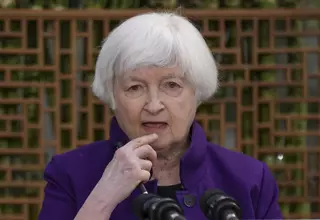Sweden on Track to Meet 100-Percent Renewables Target by 2040: Regulator

Singapore. Sweden is on track to produce all its energy from renewable sources by 2040, a top regulatory official from the country said.
Renewables such as hydro and wind last year accounted for 57 percent of the Nordic nation's 159 terawatt-hours (TWh) of power production, with most of the rest coming from nuclear, said Anne Vadasz Nilsson, Director General of the Swedish Energy Markets Inspectorate.
"We are not densely populated, we have a lot of good places to put land-based large-scale wind and there is large potential for that in Sweden," Vadasz Nilsson told Reuters in an interview on the sidelines of the Singapore International Energy Week conference.
Swedish output of wind power has gradually increased as it becomes more cost-efficient, and it now makes up 10 percent of the country's overall energy production, from almost zero several years ago, she said.
Sweden aims to add 18 terawatt-hours (TWh) of annual renewable electricity production by 2030.
It does not plan to subsidize more nuclear energy and it is unlikely that any new atomic reactors will be built given low power prices, said Vadasz Nilsson. That is despite a deal earlier this year to cut taxes on nuclear power generators.
"Nuclear is quite an expensive energy source due to safety regulations and funding for long-term nuclear waste management among other things," she said.
"Renewables, meaning large-scale wind in Sweden, on the other hand, are cheaper and cheaper to commission and to run. This together with low wholesale prices will make it less likely that new nuclear power plants will replace the remaining ones when they are phased out due to old age."
Four of Sweden's 10 nuclear reactors are currently being phased out, she said. Nuclear power has come under increased scrutiny around the world in the wake of Japan's Fukushima disaster in 2011.
Sweden has no immediate plans to build any new hydropower plants due to environmental concerns, she added.
"However our simulations show that due to the base load from our (current) hydropower plants and the high degree of interconnection with neighboring countries, the hours with very high prices, indicating scarcity of capacity, will be quite few," Vadasz Nilsson said.
"This together with a more developed market for demand-side response will safeguard capacity even on cold winter days when the wind is not blowing."
Reuters
Tags: Keywords:POPULAR READS
Yellen Says Iran's Actions Could Cause Global 'Economic Spillovers'
Iran's missile attack on Israel early Sunday came in response to what it says was an Israeli strike on Iran's consulate in Syria.Prabowo Camp Cites ‘Procedural Error’ in Legal Challenge by Rival Candidates
The Constitutional Court's main task is to address alleged discrepancies in vote tallies, which neither of the plaintiffs challenged.Apple Wants to Increase Investments in Vietnam
Vietnam has become more important to Apple as the company seeks to diversify its supply chains away from China.China’s Top Diplomat Wang Yi to Visit Indonesia for Cooperation Talks
Chinese top diplomat Wang Yi will chair a policy coordination meeting aimed at strengthening Indonesia-China cooperation.President Jokowi Urges Global Restraint as Tensions Rise in the Middle East
President Joko "Jokowi" Widodo emphasized the importance of diplomatic efforts to prevent the escalation of conflict in the Middle EastPopular Tag
Most Popular






















